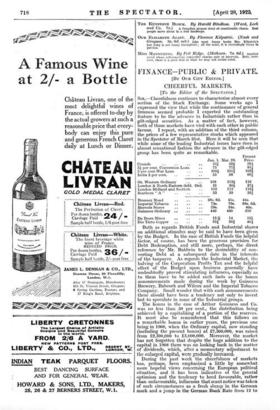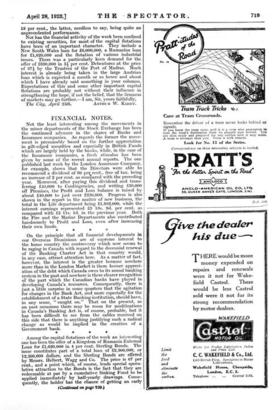FINANCE—PUBLIC & PRIVATE.
[BY OUR CITY EDITOR.]
CHEERFUL MARKETS.
[To the Editor of the SPECTATOR.] SIR,—Cheerfulness continues to characterize almost every section of the Stock Exchange. Some weeks ago I expressed the view that while the continuance of general firmness seemed probable I expected the outstanding feature to be the advance in Industrials rather than in gilt-edged securities. As a matter of fact, however, both of those markets have vied with each other in public favour. I repeat, with an addition of the third column, the prices of a few representative stocks which appeared in the Spectator of March 31st. Here it will be seen that while some of the leading Industrial issues have risen in almost sensational fashion the advance in the gilt-edged group has been quite as remarkable.
Consols • • •• •• •• 31 per cent. Conversion Loan • • 5 per cent.War Loan ..
India 3 per cent. ..
Gt. Western Ordinary ..
London & North-Eastern defd. Ord. London Midland and Scottish
Southern " A " .
38s. 6d. 41s. 44s.
73s. 79s. 88s. 6d.
28s. 34s. 40s.
440 440 510 De Beers Mines .. 13# 14 151 Rio Tinto Copper .. 331 361 401
Both as regards British Funds and Industrial shares an additional stimulus may be said to have been given by the Budget. In the case of British Funds the helpful factor, of course, has been the generous provision for Debt Redemption, and still more, perhaps, the direct reference by Mr. Baldwin to the desirability of con- verting Debt at a subsequent date in the interests of the taxpayer. As regards the Industrial Market, the halving of the Corporation Profits Tax and the helpful effect of the Budget upon business generally have Undoubtedly proved stimulating influences, especially as to them have to be added such facts as the bonus announcements made during the week by Guinness Brewery, Babcock and Wilcox and the Imperial Tobacco Company. Small wonder that with such announcements there should have been a tendency not only to invest but to speculate in some of the Industrial groups.
The bonus in the case of Arthur Guinness and Co. was no less than 50 per cent., the distribution being achieved by a capitalizing of a portion of the reserves. It must also be remembered that this follows on a remarkable bonus in earlier years, the previous one being in 1908, when the Ordinary capital, now standing (including the present bonus) at £7,500,000, was raised from £2,500,000 to £5,000,000. Moreover, the market has not forgotten that despite the huge addition to the capital in 1908 there was no looking back in the matter of dividends, which, after a momentary adjustment to the enlarged capital, were gradually increased. During the past week the cheerfulness of markets has, perhaps, been emphasized a little by somewhat more hopeful views concerning the European political situation, and it has been indicative of the general optimism and the tendency to heed favourable, rather than unfavourable, influences that scant notice was taken of such circumstances as a fresh slump-in the German mark and a jump in the German Bank Rate from 12 to
Jan. 1. Mar. 28. 551 N1 75 771 1001 1011 55 58 109 1131 31 361 103 113 33 39 Present Price. 591 81 103 601 116 37
11611
391 Brunner Mond Imperial Tobacco ..
Harrods Stores .. Guinness Ordinary ..
•• ••
18 per cent., the latter, needless to say, being quite an unprecedented performance. Nor has the financial activity of the week been confined to existing securities, for most of the capital flotations have been of an important character. They include a New South Wales loan for £6,000,000, a Rumanian loan for £1,620,000 and the flotation of various industrial issues. There was a particularly keen demand for the offer of £330,000 in 5i per cent. Debentures at the price of 971 by the Trustees of the Port of Madras. Much interest is already being taken in the large Austrian loan which is expected a month or so hence and about which I have already said something in your columns. Expectations of this and some other important capital flotations are probably not without their influence in strengthening the hope, if not the belief, that the firmness of markets may go further.—I am, Sir, yours faithfully,



















































 Previous page
Previous page